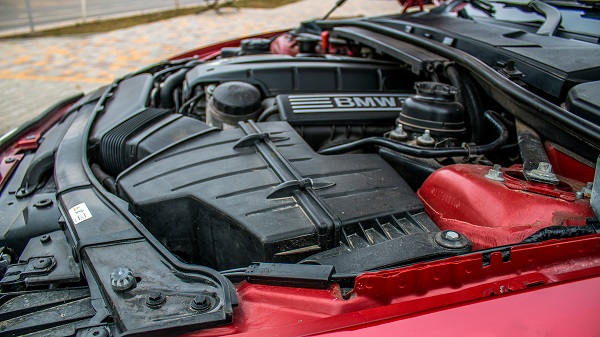The Climate of Portland, Oregon: Seasons and Weather Patterns
September 25, 2024
Steve’s Imports Marks 48 Years as Portland’s Premier Auto Repair Shop
November 7, 2024Everything You Need to Know About Maintaining Your BMW: Answers to Your Most Pressing Questions
To maintain your BMW’s performance, schedule regular service every 6,000 miles or 6 months, which includes oil changes with high-quality synthetic oil. Tire rotation is recommended every 5,000 to 7,500 miles to ensure even wear. Expect your battery to last between 3 to 5 years, but check it regularly, particularly in extreme temperatures. Additionally, specialized service centers should be utilized that employ trained technicians and offer genuine parts. This ensures your BMW receives optimal care. To further enhance your vehicle’s upkeep and discover specific maintenance tips, there’s plenty more to explore regarding BMW service requirements.
Importance of Authorized Service Centers
When it comes to servicing your BMW, choosing a specialized service shop is crucial. These centers employ certified technicians who are specifically trained in BMW’s unique engineering and technology. This specialized knowledge ensures that your vehicle receives the expert care it deserves.
Authorized service centers also use genuine parts that meet BMW’s stringent quality standards. This guarantees proper fit and performance, enhancing your vehicle’s longevity and reliability. By using original components, you help maintain your car’s integrity, which is essential for optimal performance.
Another key benefit is access to accurate maintenance schedules, technical service bulletins, and BMW software. Authorized centers are well-informed about the recommended service intervals for various BMW models, ensuring your vehicle’s upkeep aligns with manufacturer guidelines. This adherence to maintenance schedules not only preserves your vehicle’s performance but can also positively impact its resale value.
Ultimately, the quality assurance provided by specialized BMW repair facilities often exceeds that of non-authorized ones. With comprehensive services tailored specifically for BMWs, you can trust that every aspect of your vehicle’s upkeep is managed with precision and care.
Choosing a BMW specialized service center is a smart investment in your BMW’s future.
How Often Should I Get BMW Maintenance?

Maintaining your BMW is essential for its performance and longevity, and knowing the right intervals for service can make all the difference. Generally, you should schedule a BMW service every 10,000 miles or 12 months for an oil service. This routine maintenance is crucial for ensuring optimal engine performance and longevity.
In addition to oil service, you’ll need to keep an eye on more extensive inspections. Inspection I should occur approximately every 30,000 miles, providing a comprehensive check of various vehicle systems and components.
For a more thorough evaluation, Inspection 2 is recommended every 60,000 miles to address potential issues that may arise over time.
Note that BMW uses CBS, which stands for Condition Based Service. BMW monitors time, mileage, and driving conditions to properly calculate service due. With this said, not all BMW’s have the same service due at the same mileage.
Adhering to these service intervals is vital for maintaining your vehicle’s warranty and preserving its resale value. Regular maintenance not only enhances engine performance but also contributes to better fuel efficiency and increased safety on the road.
What Type of Oil Should I Use on My BMW?
Choosing the right oil for your BMW is crucial for ensuring optimal engine performance and longevity. BMW recommends using high-quality synthetic oil specifically formulated for their engines, adhering to BMW Longlife specifications. The right engine oils not only enhance performance but also help maintain warranty coverage.
When selecting oil, pay attention to the viscosity rating. Commonly recommended grades for your BMW include 0W-30 or 5W-30, depending on your specific model and climate conditions. Using the correct oil type ensures your engine runs efficiently, reducing wear and improving fuel economy. Your BMW repair shop may recommend changing the viscosity rating based on mileage and extreme weather change.
Regular oil changes should occur every 6,000 miles or 6 months despite BMW’s manufacturer recommendation of 10,000 miles. Newer model BMW’s, especially the 2.0 liter and turbo motors, have shown to develop premature engine wear and failing timing chain components due to long term oil service intervals such as 10,000 miles and higher intervals. These intervals are often argued over by BMW fanatics, however the evidence shows that Independent BMW repair facilities and dealerships are unanimously finding premature engine failure on vehicles with higher mileage service intervals.
Skipping oil changes or using subpar oils can lead to engine issues and reduced performance. Always opt for quality engine oils to ensure compatibility and reliability.
Is It Time for You to Get BMW Service?
At Steve’s Imports, we focus on using original parts to ensure the longevity of your vehicle.
How Often Should I Rotate My BMW Tires?
Regularly rotating your BMW tires is essential for ensuring even wear and maximizing their lifespan. However, many BMW’s have offset tire sizing, which will not allow for tire rotations. It is crucial to have your BMW’s alignment checked yearly to avoid premature tire wear.
It’s generally recommended to perform tire rotation every 5,000 to 7,500 miles. This routine service helps maintain balanced wear, especially since front tires on BMW vehicles often wear faster due to the weight of the engine and braking forces.
By following the manufacturer’s guidelines for tire rotation, you can enhance your vehicle’s performance and safety. Properly inflated tires also play a crucial role in this process, as they ensure optimal traction and stability, contributing to better fuel efficiency.
Neglecting tire rotation and wheel alignments can lead to premature and uneven tire wear, which may result in poor handling and traction and expensive tire replacements. To keep your BMW driving smoothly, make sure and have your alignment checked and adjust tire pressures appropriately.
Not only will this practice prolong your tires’ life, but it will also improve your overall driving experience.
How Long Will My BMW Battery Last?
Understanding how long your BMW battery will last is crucial for preventing unexpected breakdowns. Typically, a BMW battery lasts between 3 to 5 years. However, this lifespan can vary based on your driving habits and environmental conditions.
BMW uses a battery monitoring system, which utilizes a sensor called an IBS (Intelligent Battery Sensor). This system unfortunately sees common failure and is known to cause electrical faults. It is important to be cognizant of warning lights on your dash. Your battery light is typically turned on by your IBS, which is telling you that your battery is not charging properly or your IBS is not working as designed.
Be mindful that extreme temperatures—both hot and cold—can adversely affect your battery’s performance and longevity.
Watch for signs that indicate your battery may need to be replaced. These include dimming lights, slow engine cranking, and the battery warning light illuminating your dashboard. If you notice any of these symptoms, it’s wise to consider a replacement.
Additionally, proper care can enhance your battery’s overall health. Keeping the terminals clean and ensuring a secure connection can significantly impact performance.
Lastly, do not replace your battery without proper adaptation tooling. Your smart charging system needs the battery to be registered within the vehicle’s computer to avoid improper charging, inaccurate monitoring, and therefore premature battery failure.
What Are the Special Requirements for BMW Vehicles?
For BMW vehicles, adhering to specific maintenance requirements is essential to ensure optimal performance and longevity.
Brake fluid changes are also vital, and it is recommended every two years to maintain braking efficiency and safety. BMW primarily uses Dot 4 or higher grades for this purpose. Brake fluid contamination is typically due to moisture intrusion, which breaks down the fluid causing corrosion within your hydraulic brake system.
When it comes to replacing components, always opt for factory BMW parts or OE spec aftermarket parts. Using the correct brake pads and other BMW parts ensures compatibility and adheres to manufacturer specifications, which is critical for both safety and vehicle performance.
Your engine also requires spark plug replacement during its maintenance interval. BMW has increased its Spark Plug maintenance interval from 100,000 miles to every 60,000 miles due to the importance of having a good, clean, strong ignition spark. Failing spark plugs will cause misfires, rough running, and can cause coil pack failure as well as eventually destroying your catalytic converter.
Key fob batteries are often overlooked as well. Make sure and have your key battery replaced every 4 years to avoid getting locked out of your vehicle!
Make sure to keep track of these requirements and schedule your service appointment promptly. By following these guidelines, you’ll protect your investment and enjoy the exceptional performance your BMW is designed to deliver.
Trust the BMW Technicians at Steve’s Imports for Maintenance
Trusting the expertise of certified BMW technicians at Steve’s Imports ensures your vehicle receives the meticulous care it deserves. With decades of service experience, our service center specializes in maintaining and repairing common BMW models, from classic favorites to the latest series.
Our certified mechanics are well-versed in handling a wide array of services, including brake inspections, tire rotations, and complex BMW engine repairs. We understand the intricacies of BMW engineering, which is crucial for keeping your car in optimal condition.
Our technicians utilize state-of-the-art diagnostic equipment to accurately identify issues and provide effective solutions. Whether you’re facing a cooling system failure or need BMW maintenance specialists, we prioritize thoroughness and precision in every service we offer.
Is It Time for You to Get BMW Service?
At Steve’s Imports, we focus on using original parts to ensure the longevity of your vehicle.
Our commitment to exceptional service means you can trust us to address challenges like DME failures or coolant or oil leaks promptly.
Visit our Qualifications page to see what makes our techniques stand out from other BMW repair shops.


